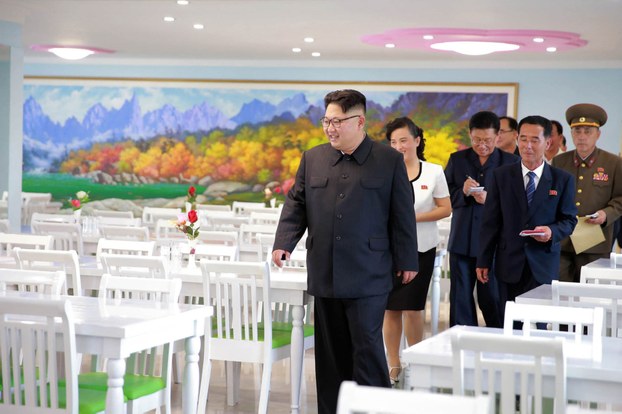North Korean parents catch 'private education fever'
| Publisher | Radio Free Asia |
| Publication Date | 6 July 2016 |
| Cite as | Radio Free Asia, North Korean parents catch 'private education fever', 6 July 2016, available at: https://www.refworld.org/docid/579ef4fa25.html [accessed 21 May 2023] |
| Disclaimer | This is not a UNHCR publication. UNHCR is not responsible for, nor does it necessarily endorse, its content. Any views expressed are solely those of the author or publisher and do not necessarily reflect those of UNHCR, the United Nations or its Member States. |
2016-07-06
 This undated picture released from North Korea's official Korean Central News Agency shows North Korean leader Kim Jong Un (C) inspecting a newly built secondary school in Pyongyang, July 13, 2016. AFP
This undated picture released from North Korea's official Korean Central News Agency shows North Korean leader Kim Jong Un (C) inspecting a newly built secondary school in Pyongyang, July 13, 2016. AFP
North Korean parents are catching "private education fever" as more and more of them are risking arrest as they venture outside the secretive state's educational system in the hope that a private tutor will help their children get into a top university.
"The goal of these parents is to send their children overseas or to the best colleges in Pyongyang," a North Korean who recently visited China told RFA's Korea Service. "There have been slogans going around saying: 'Let's send them overseas!' or 'Let's send them to Pyongyang!'"
In North Korea, where the state tightly controls education, hiring a private tutor is illegal, but more and more parents are taking the risk and paying the price
"Subjects like mathematics, physics or any other of the core studies cost 100 [Chinese] yuan (U.S. $15.00) per month in Pyongyang, whereas subjects that need specialized skills like computer programming cost between 200-500 yuan (U.S. $30-$75) per month," said the source, who talked to RFA on condition of anonymity.
The fever doesn't end with academics as so-called "extreme" North Korean parents, who want to raise "civilized" children, pay more so their kids can learn to play at least one instrument and take part in athletics, explained the source.
"Children of the privileged class in Pyongyang spend about 1000 yuan (U.S. $150) monthly for private education expenses," the source said.
The price is actually higher as parents also have to bribe education officials to get their kids out of class or other state obligations.
"If parents want private education for their children, those students must be excused from the public school's regular courses or other social labor," the source said. "In order to do this, parents must hand over bribery money to the school principal or the teacher to excuse students from regular courses."
North Korean security authorities and the State Education Commission are beginning to take notice as they have beefed up attempts to catch the tutors, a North Korean trade official told RFA.
While North Korean officials appear to be concerned that private education can undermine the state-sponsored system, ending the practice could prove difficult as the parents that hire the tutors are often powerful people, the official said.
Although public schools provide gifted classes, the government support for them is extremely limited and there is little incentive for educators to teach advanced classes. Parents also see their children's grades stagnating and have little hope that the state education will improve causing "private education fever" to spread, the sources said.
The North Korean government isn't just depending on enforcement to bring "private education fever" under control as it is organizing short, intense courses at the public schools to counter the trend as well as ramping up its public criticism of private education.
Reported by Young Jung for RFA's Korea Service. Translated by Jackie Yoo. Written in English by Brooks Boliek.
Link to original story on RFA website
